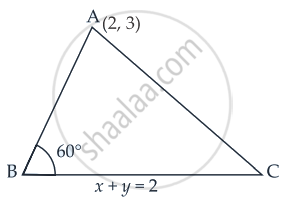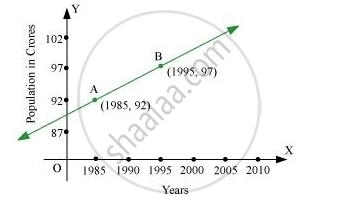Advertisements
Advertisements
Question
The vertex of an equilateral triangle is (2, 3) and the equation of the opposite side is x + y = 2. Then the other two sides are y – 3 = `(2 +- sqrt(3)) (x - 2)`.
Options
True
False
Solution
This statement is True.
Explanation:
Let ABC be an equilateral triangle with vertex (2, 3) and the opposite side is x + y = 2 with slope –1.
Suppose slope of line AB is m.
Since each angle of equilateral triangle is 60°.
∴ Angle between AB and BC
tan 60° = `|(-1 - m)/(1 + (-1)m)|`
⇒ `sqrt(3) = |(1 + m)/(1 - m)|`
⇒ `sqrt(3) = +- ((1 + m)/(1 - m))`
Taking (+) sign,
`sqrt(3) = (1 + m)/(1 - m)`
⇒ `sqrt(3) - sqrt(3)m = 1 + m`
⇒ `sqrt(3)m + m = sqrt(3) - 1`
⇒ `m(sqrt(3) + 1) = sqrt(3) - 1`
⇒ `m = (sqrt(3) - 1)/(sqrt(3) + 1)
⇒ `m = (sqrt(3) - 1)/(sqrt(3) + 1) xx (sqrt(3) - 1)/(sqrt(3) - 1)`
⇒ `m = (3 + 1 - 2sqrt(3))/(3 - 1)`
= `2 - sqrt(3)`
Taking (–) sign,
`m = 2 + sqrt(3)`
So, the equations of other two lines are y – 3 = `(2 +- sqrt(3))(x - 2)`
APPEARS IN
RELATED QUESTIONS
Find the slope of a line, which passes through the origin, and the mid-point of the line segment joining the points P (0, –4) and B (8, 0).
Find the value of x for which the points (x, –1), (2, 1) and (4, 5) are collinear.
Without using distance formula, show that points (–2, –1), (4, 0), (3, 3) and (–3, 2) are vertices of a parallelogram.
Find the angle between the x-axis and the line joining the points (3, –1) and (4, –2).
Consider the given population and year graph. Find the slope of the line AB and using it, find what will be the population in the year 2010?

Find the slope of a line passing through the following point:
\[(a t_1^2 , 2 a t_1 ) \text { and } (a t_2^2 , 2 a t_2 )\]
State whether the two lines in each of the following are parallel, perpendicular or neither.
Through (5, 6) and (2, 3); through (9, −2) and (6, −5)
The slope of a line is double of the slope of another line. If tangents of the angle between them is \[\frac{1}{3}\],find the slopes of the other line.
Find the angle between the X-axis and the line joining the points (3, −1) and (4, −2).
Find the angle between X-axis and the line joining the points (3, −1) and (4, −2).
Find the equation of a line which is perpendicular to the line joining (4, 2) and (3, 5) and cuts off an intercept of length 3 on y-axis.
Find the equation of the perpendicular to the line segment joining (4, 3) and (−1, 1) if it cuts off an intercept −3 from y-axis.
Find the equation of the strainght line intersecting y-axis at a distance of 2 units above the origin and making an angle of 30° with the positive direction of the x-axis.
Find the tangent of the angle between the lines which have intercepts 3, 4 and 1, 8 on the axes respectively.
Show that the line a2x + ay + 1 = 0 is perpendicular to the line x − ay = 1 for all non-zero real values of a.
The acute angle between the medians drawn from the acute angles of a right angled isosceles triangle is
The angle between the lines 2x − y + 3 = 0 and x + 2y + 3 = 0 is
The equation of the line with slope −3/2 and which is concurrent with the lines 4x + 3y − 7 = 0 and 8x + 5y − 1 = 0 is
The equation of a line passing through the point (7, - 4) and perpendicular to the line passing through the points (2, 3) and (1 , - 2 ) is ______.
Find the equation of the straight line passing through (1, 2) and perpendicular to the line x + y + 7 = 0.
If the line joining two points A(2, 0) and B(3, 1) is rotated about A in anticlock wise direction through an angle of 15°. Find the equation of the line in new position.
The two lines ax + by = c and a′x + b′y = c′ are perpendicular if ______.
Find the equation of a straight line on which length of perpendicular from the origin is four units and the line makes an angle of 120° with the positive direction of x-axis.
Find the equation of one of the sides of an isosceles right angled triangle whose hypotenuse is given by 3x + 4y = 4 and the opposite vertex of the hypotenuse is (2, 2).
A variable line passes through a fixed point P. The algebraic sum of the perpendiculars drawn from the points (2, 0), (0, 2) and (1, 1) on the line is zero. Find the coordinates of the point P.
Slope of a line which cuts off intercepts of equal lengths on the axes is ______.
Equations of diagonals of the square formed by the lines x = 0, y = 0, x = 1 and y = 1 are ______.
A ray of light coming from the point (1, 2) is reflected at a point A on the x-axis and then passes through the point (5, 3). The co-ordinates of the point A is ______.
